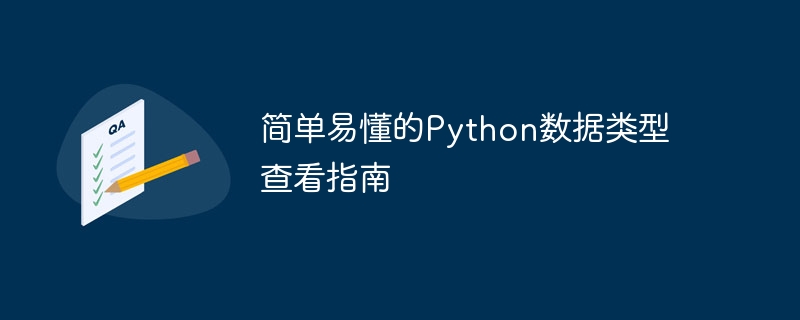
Simple and easy-to-understand Python data type viewing guide
As a high-level programming language, Python provides a wealth of data types for storing and processing data. Different data types have different characteristics and uses. This article will introduce several common Python data types and give specific code examples to help readers view and understand them.
- Integer type (int)
Integer type is one of the most basic data types in Python. It is used to store integer values, which can be positive integers, negative integers, or zero. You can view integer values by directly outputting integers.
Sample code:
num = 10
print(num) # 输出结果:10
Copy after login
- Floating point type (float)
Floating point type is used to store numbers with decimal points. It can be positive, negative, or zero, and can have decimal and exponential forms. You can view floating-point values by directly outputting floating-point numbers.
Sample code:
num = 3.14
print(num) # 输出结果:3.14
Copy after login
- String type (str)
String type is used to store text type data, which consists of a series of characters. Strings are enclosed in single or double quotes. You can view the value of a string by directly outputting the string.
Sample code:
str = 'Hello World!'
print(str) # 输出结果:Hello World!
Copy after login
- List type (list)
The list type is used to store a series of elements, which can be different data types. The list is mutable and can be added, deleted, modified, and checked. You can view the values of the list by directly outputting the list.
Sample code:
list = [1, 2, 3, 4, 5]
print(list) # 输出结果:[1, 2, 3, 4, 5]
Copy after login
- Tuple type (tuple)
The tuple type is also used to store a series of elements. Unlike the list, the tuple type It is immutable, that is, it cannot be modified. You can view the value of a tuple by directly outputting the tuple.
Sample code:
tuple = (1, 2, 3, 4, 5)
print(tuple) # 输出结果:(1, 2, 3, 4, 5)
Copy after login
- Dict type (dict)
Dict type is used to store data of key-value pairs, where each key is associated with a value . The dictionary is mutable and can be added, deleted, modified, and searched. You can view the values of the dictionary by directly outputting the dictionary.
Sample code:
dict = {'name': 'Alice', 'age': 20, 'gender': 'female'}
print(dict) # 输出结果:{'name': 'Alice', 'age': 20, 'gender': 'female'}Copy after login
- Set type (set)
Set type is used to store a set of unordered and unique elements. Sets have the function of deduplication and can perform common operations such as intersection and union. You can view the values of a collection by directly outputting the collection.
Sample code:
set = {1, 2, 3, 4, 5}
print(set) # 输出结果:{1, 2, 3, 4, 5}Copy after login
Through the above code examples, we can easily view the values of various Python data types. This is very helpful for debugging and verifying when we write programs. I hope this article can help readers better understand and use Python data types.
The above is the detailed content of An easy-to-understand guide to viewing Python data types. For more information, please follow other related articles on the PHP Chinese website!






